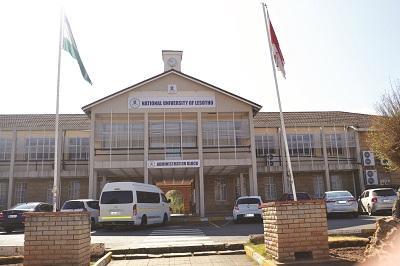Thoboloko Ntšonyane
Africa-Press – Lesotho. Following the government’s spirited efforts to host the Water and Hydrogen and Digital Future Conference and Expo that is scheduled to take place in Maseru on October 12 – 13 in Maseru, hydrogen has become a hot topic fueling debates amongst different stakeholders within the society.
These developments had triggered National University of Lesotho’s (NUL) Scientists through the Chemistry Society to host a webinar on Sunday night that was aimed to shed more light on the importance of hydrogen to the economy, the vision that the government had adopted.
In a webinar that attracted about 300 eager-to-learn participants, the Chemists deemed the proposed hydrogen powered economy could be viable, but warned that its potential hinges on a robust financial commitment and diverse stakeholder engagement.
As per Lesotho’s vision of a sustainable digital hydro nation, the government wants “to develop Lesotho to become a sustainable digital hydro nation” and “it aims to develop a strategy that will position the Kingdom as a sustainable digital hydro nation and to address four overarching themes.
The Ministry of Natural Resources had said this soon to be hosted Conference and Expo offers a platform for commencement of its journey to the “sustainable digital hydro nation “.
These themes are; Water, Hydrogen and Digital for Life; Water, Hydrogen and Digital for Green Growth and Development; Water, Hydrogen and Digital for Human Capital Development and Water, Hydrogen and Digital for Regional Development.
The Ministry aspires to generate 5 000 MW of electricity and to export excess to South Africa and Contribute to the SADC (Southern African Development Community) pool. The African Development Bank has pledged to the tune of 15 000 USD about M290 000 towards the costs of the conference.
In a letter confirming the bank’s participation Oswald Mulenga Chanda is quoted saying “the bank believes that the question of what Lesotho can do with its water endowment is an important one, given that, despite this abundance and the progress made so far for the reach the Sustainable Development Goals (SDG) 6 targets for water and sanitation for all by 2030, there is still more to achieve these objectives “.
Dr Emmanuel Tanor from the NUL Department of Chemistry and Technology pointed out that the hydrogen economy is not novel, it has been in existence for the past 200 years.
He said the hydrogen economy is the state in which the energy delivery infrastructure is based on hydrogen. The hydrogen, he said, can be used chemically or biologically. Dr Tanor said people should ask why the hydrogen hype? And where is Lesotho?
He showed a time-line graph that has different stages from innovation trigger, peak of inflated expectations, trough of disillusionment, and slope of enlightenment saying people should interrogate where Lesotho is at.
For his part, the Dean of Faculty of Science and Technology Prof Mosotho George emphasized that extensive research should be undertaken to establish the maximum benefit the country can get with its precious resources if it needs to explore the hydrogen economy.
He also mentioned that the government needs to also heavily invest in human capital to sustain the economy. He also said a robust framework should be in place to facilitate the hydrogen economy which the country is mulling to explore.
The Dean underscored that Lesotho needs to recognize the importance of its water resources nationally and within the international context, adding that the water environment should be well managed if the country is to derive optimum advantages from it.
Prof George said green hydrogen could be a better option for Lesotho as it is highly endowed with water resources adding that it has a minimal impact on the environment.
As Lesotho is largely a consumer-based economy, this Prof George said could not augur well for the country as even exploring the hydrogen it will still be forced to import in quantities, the country will benefit mostly on labour.
Also from NUL Department of Chemistry and Technology Dr Thabang Ntho said collaboration is critical by many stakeholders including government, scholars, and investors.
“Everyone must come to the party and participate,” he stressed. Dr Ntho said Lesotho should do well to borrow a leaf from the books of advanced economies who are already benefiting from the hydrogen economy.
Pointing out the country’s weakness, he said there are no strong research institutions to produce high quality information on hydrogen to support the economy and cautioned the country will need to outsource these expertise at a very high cost.
For a well-run hydrogen economy to take place, Dr Ntho said there should be highly qualified technicians, engineers, researchers that will sustain the economy.
He also reiterated that the hydrogen economy needs to be grounded on a properly sound legal framework. The NUL Chemist said a specific institution may need to be established to run this industry.
Outlining the positive outcomes from hydrogen, he said it could be used in transport and industry sectors, may be used in different fields and it is a renewable and abundant energy source.
Be that as it may, challenges that lie ahead include large scale production and costs, advanced infrastructure development is required and amongst them are well built and maintained roads.
He warned against monopoly, saying competition drives innovation and that the space should be opened to accommodate many players in the context of hydrogen economy.
Meanwhile, the critics’ major concern is that some people involved in this project with the government may have ulterior motives, jeopardizing the country’s resources. The expo has been mired in controversies which were flagged last week by the parliament’s Natural Resources Portfolio Committee.
The Water and Hydrogen Conference and Expo continues despite the calls by the Committee for the Ministry of Natural Resources to go back, do things properly, and follow due process.
The Committee established that the Ministry entered into a MoU (Memorandum of Understanding) with Metsi ke Bophelo Advocacy, non-profit making organisation before it could be legally registered.
The signing of MoU between Metsi ke Bophelo Advocacy and the Ministry of Natural Resources happened on August 25th while the organization came into existence the next month of September.
Attorney-General Advocate Rapelang Motsieloa KC also advised that the signing was improper and suggested that it should be terminated. The owner of Metsi ke Bophelo Advocacy, the South Africa’s entrepreneur Mashudu Ramano who is also the founder of Mitochondria Energy Company, the company involved in the energy sector. Ramano also appeared before the Committee and told it about his track record and that he has quite extensive experience with holding conferences.
Reacting to these developments, concerned citizens calling themselves ‘Tsa habo moshemane ha li jooe’ released a statement saying they “hope that the Ministry [of Natural Resources] shall view this experience as a learning curve and therefore they shall take reasonable corrective steps to accommodate an active role of Basotho; if the Ministry willfully complies, we no longer see a need for judicial intervention.
, we make a solemn commitment to Basotho to advocate for socio-economic justice in our homeland”.
The Minister of Natural Resources Hon Mohlomi Moleko acknowledged that the process was not properly handled and promised to rectify it, committing to abide by the rules as per the Committee’s instructions.
Last month, Nthakoana Ngatane, who is the conference Communications Liaison Officer, told this publication that the government had approached and sold its idea of exploring potential benefits within the water sector to Ramano.
Ramano, she said, will be critical in guiding Lesotho on how to strategically harness opportunities related to water including consumption and for economic purposes, among others.
She said Lesotho can become a digital storage of water related information which could be used for different purposes including by academics, researchers, and business.
The Minister of Natural Resources said the conference is expected to attract experts throughout the world who will teach Lesotho on how to leverage the hydrogen related technologies within the water industry.
“Notably you have Hydrogen whereby the world is moving to Hydrogen as a fuel source for instance to power planes, to power cars, so you can actually see that the whole world is moving towards Hydrogen as a source of energy.
“Now, with us having water, we actually have abundant Hydrogen but before we can do anything with that, we have to learn about it.
We have to have this where [we] as Basotho and the world in general will be taught about Hydrogen, about oxygen so that we can see what kind of projects the government can undertake which are safe and sound for the nation,” the Minister said.
For More News And Analysis About Lesotho Follow Africa-Press






